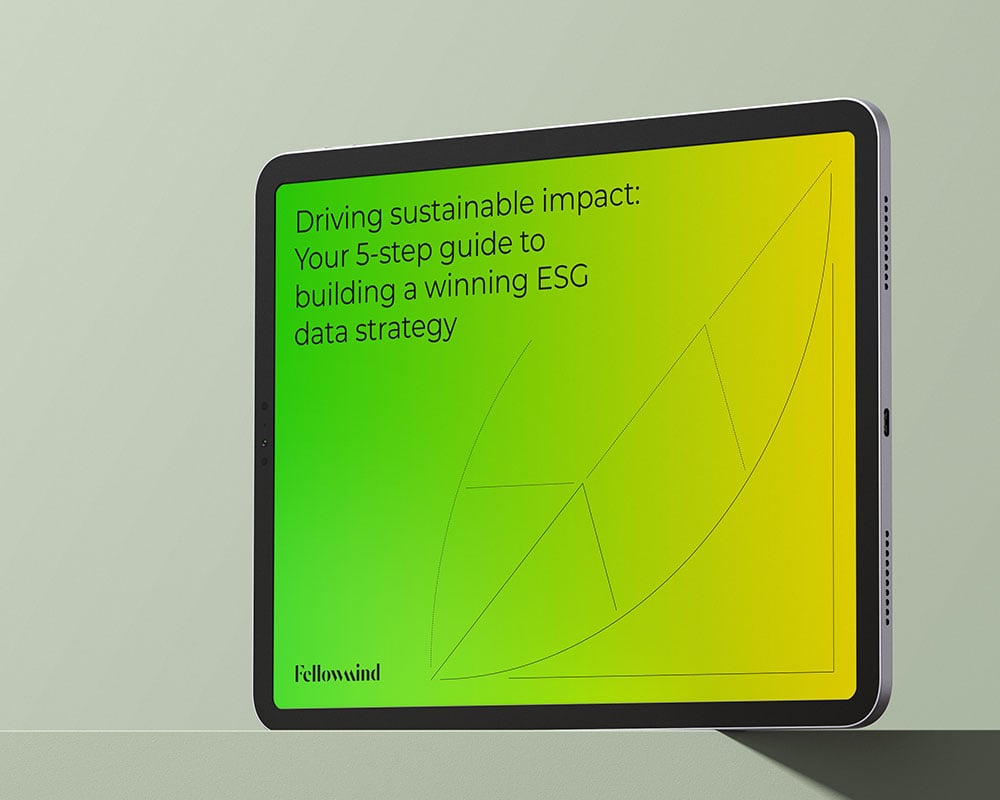Unlocking the true business value of sustainability
Sustainability is no longer a secondary concern for businesses; it is a central pillar that can significantly boost long-term success. By integrating sustainability into your company’s overall business strategy and aligning goals related to concerns for the environment and society with core business objectives, creates synergies that drive growth, innovation, and competitive advantage.

Did you know that adopting a data-driven approach to sustainability is not just best practice but a necessity in today's business landscape? It enables your company to measure, track, and optimize its sustainability initiatives, ensuring it contributes to business value while fulfilling environmental, social, and governance (ESG) commitments.
The business value of a sustainable model
The sustainability consulting market is expected to experience significant growth, more than doubling in size by 2027. According to a study by the research firm Verdantix, the market is projected to grow from $6.24 billion in 2021 to $16 billion by 2027, representing a compound annual growth rate (CAGR) of approximately 17%. This growth is driven by increasing regulatory pressures and the need for businesses to adapt their models to meet environmental, social, and governance (ESG) standards. This growth reflects the increasing importance of sustainability in business transformation and the corresponding demand for technology adoption and IT services. When you integrate sustainability into your core operations, you can tap into new markets, enhance efficiency, and reduce costs, ultimately driving profitability and growth.
Growing with customer demand for sustainability
Consumer demand for sustainable products and services is on the rise. By meeting these demands, your business can expand its market share and enhance customer loyalty. This shift in consumer behavior provides a significant growth opportunity for companies like yours that can anticipate and meet these evolving expectations.
Differentiation from competitors
In an increasingly crowded marketplace, sustainability can be a key differentiator. If your company demonstrates a genuine commitment to sustainability, it can distinguish itself from competitors, building a unique brand identity that appeals to both customers and stakeholders. This differentiation is not just about marketing; it is about embedding sustainability into the very fabric of your business, from a responsible supply chain management limiting the risks of bribery and anti-corruption as well as a genuine concern for workers along the value chain to sourcing more environmentally friendly raw materials, more sustainable product designs and ultimately reshaping your business models to circularity
Increasing resource efficiency and performance
Sustainability initiatives often lead to greater efficiency in resource use, which in turn enhances operational performance. By optimizing energy consumption, reducing waste, and improving supply chain sustainability related activities such as transports, use and end-life treatment of your sold products, your businesses can lower costs and increase profitability. This efficiency is crucial in a world where resources are becoming limited and more expensive, making it a key driver of long-term business success.
Reducing costs
A sustainable approach often leads to significant cost savings. You can reduce expenses by minimizing waste, conserving energy, and improving resource efficiency. These savings can be reinvested into further sustainability initiatives, creating a virtuous cycle that benefits both the environment and the bottom line. Moreover, proactively managing your environmental impact is less likely to face costly fines and penalties, further protecting your financial health.
Improving brand reputation
Sustainability can significantly enhance your company’s brand reputation. As consumers and investors increasingly prioritize ESG criterias, if you can demonstrate your commitment to sustainability, you are likely to enjoy a stronger brand image. This improved reputation not only attracts customers but also draws in talent and investors who are looking for companies that align with their values. A strong reputation built on sustainability can also lead to greater customer loyalty, reducing churn and increasing lifetime customer value.
Attracting customers, talent, and investors
Sustainability is becoming a key factor in attracting and retaining customers, talent, and investors. Consumers are more inclined to support businesses that share their values, while employees and investors are increasingly seeking out companies with strong ESG performance. By embedding sustainability into your business model, you can enhance your appeal to these crucial stakeholders, securing long-term success.
Innovating New Products and Services
Sustainability is a powerful driver of innovation. When you prioritize sustainability, you are more likely to explore new ideas, technologies, and business models that can meet emerging market demands. This innovation not only addresses sustainability challenges but also opens up new revenue streams and growth opportunities. Whether through the development of eco-friendly products or the creation of sustainable services, companies can leverage sustainability to stay ahead of the competition and meet the needs of future markets.
Compliance with regulations and avoiding reputational risks
As governments and regulatory bodies continue to tighten environmental regulations, compliance is becoming more critical than ever. If you proactively embrace sustainability, you are better positioned to meet these requirements, avoiding fines and legal challenges. Additionally, by demonstrating leadership in sustainability, your business can mitigate reputational risks, ensuring they remain in good standing with customers, investors, and the public. Non-compliance with the (CSRD) can have significant and far-reaching consequences for businesses. The CSRD, which mandates comprehensive sustainability reporting, is designed to enhance transparency and accountability across the EU.
Do you need help with your sustainability strategy?
The CSRD (Corporate Sustainability Reporting Directive) is the result of numerous prior versions of EU sustainability disclosure regulations. Its goal is to unify the diverse industry-specific and regional sustainability disclosure requirements into a cohesive framework for companies operating within the EU.
At Fellowmind, we are well equipped to help you be ready for CSRD compliance, carbon footprint accounting and making data readily available in real-time so you can make the right decisions fast and accurately.

Ramp up your sustainability digitization journey with a QuickScan
To ensure you take the right next steps in your sustainability journey, we offer a QuickScan to help you better understand your company's current maturity and how well-prepared you are to comply with sustainability-related regulations, such as the CSRD reporting.
During the QuickScan, we assess several crucial aspects of sustainability and your ESG data estate. Ultimately, you will have a personalized ESG digitization roadmap based on Microsoft technologies and an action plan containing concrete next steps in your sustainability journey. With our help, you can discover the true business value of ESG data beyond compliance.





